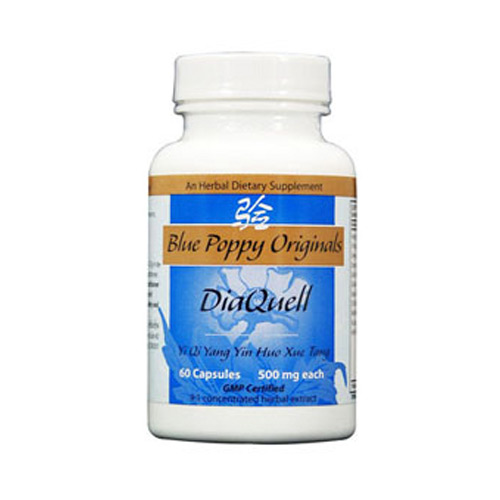DIAQUELL CAPS 60'S, BLUE POPPY
DIAQUELL CAPS 60'S, BLUE POPPY
Rx:
Huang Qi (Radix Astragali)
Xi Yang Shen (Radix Panacis Quinquefolii)
Sheng Di (uncooked Radix Rehmanniae)
Shan Yao (Radix Dioscoreae)
Dan Shen (Radix Salviae Miltiorrhizae)
Ge Gen (Radix Puerariae)
Xuan Shen (Radix Scrophulariae)
Chi Shao (Radix Paeoniae Rubrae)
Mai Men Dong (Tuber Ophiopogonis)
Fu Ling (Poria)
Indications:
This formula is for qi and yin dual vacuity complicated by blood stasis resulting in diabetes mellitus.
The signs and symptoms of qi vacuity include:
-
Fatigue
-
Lack of strength
-
Easy bruising
-
Orthostatic hypotension
-
A swollen tongue with teethmarks on its edges
-
Possible frequent urination
The signs and symptoms of yin vacuity include:
-
Dry skin
-
Dry mouth & thirst
-
Reduced sleep at night
-
Possible red tongue or red-tipped tongue with scanty fur
-
A fine pulse
The signs and symptoms of blood stasis include:
-
Static spots or macules on the tongue
-
Distended, engorged sublingual veins
-
Cherry hemangiomas
-
Spider nevi
-
Varicose veins
-
Diabetic dermopathy
Formula explanation:
Classical descriptions of thirsting and wasting all involve heat. However, these descriptions typically describe the later stages of diabetes mellitus, and, today, many people are diagnosed with diabetes without being symptomatic and without marked signs of heat. In fact, most contemporary Chinese sources agree that qi and yin dual vacuity is the most common early pattern of diabetes. Typically, this evolves from a liver-spleen disharmony based on the saying from the Nei Jing (Inner Classic), "[At] forty years, yin is automatically half." In other words, on top of a pre-existing spleen qi vacuity, there is now a yin vacuity as well. Although some patients develop diabetes early on in life, for most people, diabetes is a condition associated with aging. Therefore, in addition to qi and yin vacuity, blood stasis is a common complication. This is based on Yan De-xin’s assertion that essentially all chronic diseases associated with aging are complicated by at least an element of blood stasis. Blood stasis is definitely present in most of the complications of diabetes, such as neuropathy, nephropathy, retinopathy, and diabetic dermopathy. Thus the appropriateness of the principles of boosting the qi, nourishing yin, and quickening the blood.
Within this formula, Xi Yang Shen, Huang Qi, Fu Ling, and Shan Yao fortify the spleen and boost the qi. Shan Yao not only fortifies the spleen but also supplements the kidney qi. Xi Yang Sheng, Xuan Shen, Sheng Di, Mai Men Dong, and Ge Gen nourish yin and engender fluids. Xuan Shen also clears vacuity heat, while Ge Gen also disinhibits the qi mechanism by upbearing clear yang. Because of its cool nature, Ge Gen also clears stomach heat, the most common locus of heat in those with diabetes. Dan Shen, Sheng Di, and Chi Shao quicken, cool, and nourish the blood. Fu Ling additionally seeps dampness, thus leading yang into the yin tract (via urination).
Combinations:
If yin vacuity-fire effulgence is marked, this formula can be combined with Zhi Bai Di Huang Wan (Anemarrhena & Phellodendron Rehmannia Pills) or Da Bu Yin Wan (Greatly Supplementing Yin Pills). If lung yin vacuity is pronounced, it may be combined with Bai He Gu Jin Wan (Lily Secure Metal Pills) or Mai Wei Di Huang Wan (Ophiopogon & Schisandra Rehmannia Pills). If kidney yin vacuity is pronounced, it may be combined with Gu Ben Wan (Secure the Root Pills). If liver blood and kidney yin is marked with more prominent vision problems, one may consider combining this formula with Ming Mu Di Huang Wan (Brighten the Eyes Rehmannia Pills). If heart yin vacuity is pronounced, it may be combined with Bai Zi Yang Xin Wan (Biota Nourish the Heart Pills) or Tian Wan Bu Xin Dan (Heavenly Emperor Supplement the Heart Elixir). If kidney qi vacuity is marked, it may be combined with Jin Su Gu Jing Wan (Golden Lock Secure the Essence Pills). To increase supplementation of the qi, combine it with Shen Qi Da Bu Wan (Ginseng & Astragalus Greatly Supplementing Pills). If there is both yin and yang vacuity, combine it with Jin Gui Shen Qi Wan (Golden Cabinet Kidney Qi Pills). If blood stasis is more pronounced, it may be combined with either Ge Xia Zhu Yu Tang Wan (Below the Diaphragm Dispel Stasis Decoction Pills), Shao Fu Zhu Yu Tang Wan (Lower Abdomen Dispel Stasis Decoction Pills), Xue Fu Zhu Yu Tang Wan (Blood Mansion Dispel Stasis Decoction Pills), or Tong Qiao Hue Xue Tang Wan (Free the Flow of the Orifices & Quicken the Blood Decoction Pills) depending on the location of the blood stasis.
Dosage:
Three capsules two times per day equal not less than 30 grams of raw medicinals. However, because our extraction process is so much more efficient than stovetop decoction, we believe that this amount of our extract is actually more like the equivalent of 45-60 grams of bulk-dispensed herbs.
Contraindications:
Loose stools, diarrhea, or nausea and indigestion due to dampness.
My patient does have signs and symptoms of:
Qi vacuity Yes No
Yin vacuity Yes No
Blood stasis Yes No
Product features
Product features
Materials and care
Materials and care
Merchandising tips
Merchandising tips
Share


